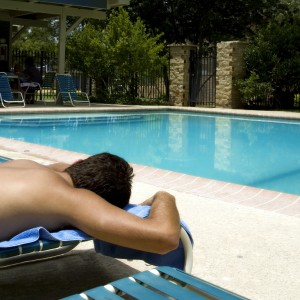 It’s summer, time to hit the beach or tanning salon for that perfect tan. Few things are more satisfying than your friends noticing how much time you spent on your tan and complimenting you on your luscious bronze glow. Why does something like our skin tone matter so much? Is it because a pale or an untanned skin triggers images of nerds who spend their entire summer indoors playing video games?
It’s summer, time to hit the beach or tanning salon for that perfect tan. Few things are more satisfying than your friends noticing how much time you spent on your tan and complimenting you on your luscious bronze glow. Why does something like our skin tone matter so much? Is it because a pale or an untanned skin triggers images of nerds who spend their entire summer indoors playing video games?
Dark skin vs Fair skin
In the American society, we associate tans with sexy supermodels, athletes and movie icons. Having a great tan is often considered a symbol of good health. A tanned skin is a way to identify our social hierarchy, kind of like the different insignias to differentiate between military ranks. Sporting a tan shows that you have the time and money to lay around all day in the sun instead of being stuck in the office all day trying to pay off the bills.
However, in the Chinese culture, the exact opposite is true. Here, the fair skinned is the prized possession. Tans are associated with those who must labor all day under the hot sun. People who have these lower paying jobs (e.g. famers or construction workers) are seen as members of the lower class. On the other hand, having fair skin means that you either have a high paying job in an office building, or are rich enough not to be out working under the beating sun. A person’s skin tone reflects their standing in society.
Because of these very different viewpoints, conflicts often arise between Chinese teenagers who have grown accustomed to the Western culture and their parents who still hold the more traditional views. Cultural conflicts are a touchy subject and not easy to resolve. However, there are some serious health concerns about sunbathing that should make you think twice before going out to get a suntan.
Dangers from the sun
Tanning greatly increases your risk of developing skin cancer. There are over 1 million new cases of skin cancer every year, with the main culprit being sun exposure. The sun’s rays can also penetrate deep into your body, damaging your immune system as well as causing premature skin aging. The major difference between your skin and that of your parents’ has to do with sun exposure.
Does getting a tan protect my skin from sunburn?
Any sort of tanning is a sign of skin damage. When UV rays hit you, they damage your skin cells. In response, the skin cells produce the dark pigment, melanin, to prevent any further damage. Melanin is the compound that causes your skin to darken and produce the tan. Contrary to popular belief, getting a tan will not protect your skin from sunburn or other skin damage. The extra melanin in tanned skin provides a Sun Protection Factor (SPF) of about 2 to 4; far below the minimum recommended SPF of 15.
How to protect your skin against sun damage
When you go hang out on the beach, shoot some hoops, or swim, be sure to apply sunscreen that has an SPF rating of at least 15 before you head out. Always reapply every 2-3 hours, especially after swimming or heavy sweating. Also make sure that you use a broad-spectrum sunscreen that blocks both UVA and UVB rays.
Are indoor tanning booths safe?
You may see that some indoor tanning salons advertise that they have a safer tanning method. The truth is that they are still exposing you to dangerous and damaging UV radiation. In fact, many states feel that indoor tanning salons are dangerous enough to ban minors from using them.
How to get a safe tan
If you’re still looking for that perfect glow for your skin, but don’t want to risk the chance of getting skin cancer, try sunless tanning products that you can apply onto your skin or salons that offer airbrush tanning. These are the only methods that are considered safe.
Where to find more information on skin cancer prevention
- Skin Cancer Foundation: http://www.skincancer.org/Healthy-Skin-Beauty/Tanning-/
- National Cancer Institute: http://www.cancer.gov/cancertopics/types/skin


